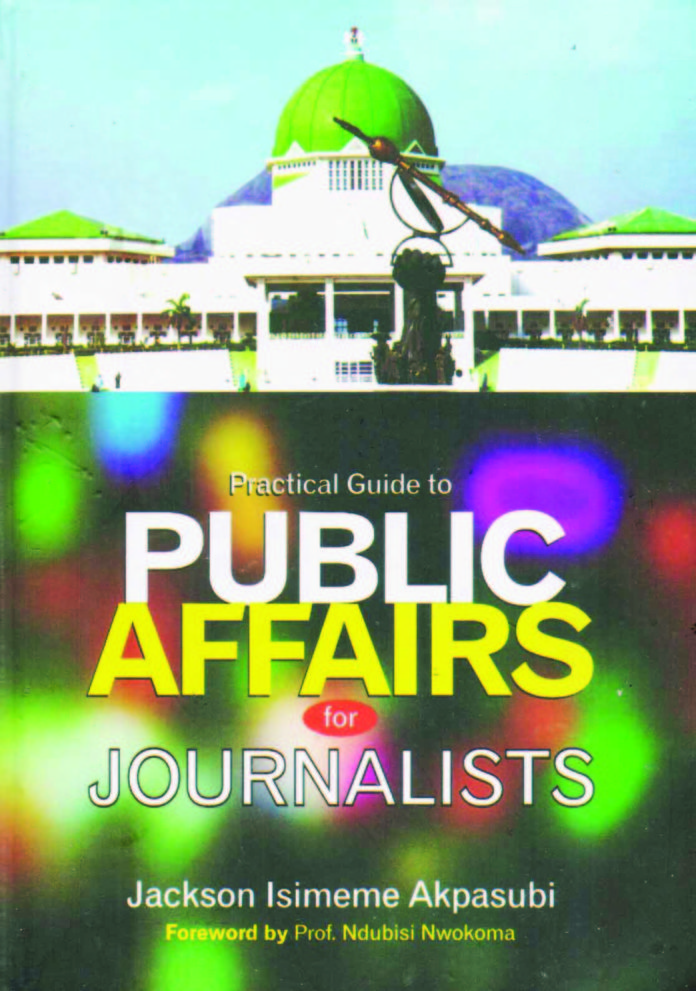Book Title: Practical Guide to Public Affairs for Journalists
Author: Jackson Akpasubi
Pagination: 218
Publisher/Year: Mirror Color MCPL Books
Reviewer: Ikechukwu Amaechi
The name, Practical Guide to Public Affairs for Journalists, encapsulates what the book is all about. It is a practical guide, literally, to journalists who want to successfully report public institutions.
Why is it necessary to have journalists nuanced in the complexities and even convolutions that define government business? Governments all over the world play dominant roles in the lives of their citizens but there is always a communication gap between the two.
It is, therefore, the responsibility of the journalist not only to bridge that gap but also to hold the government accountable.
And as Malcom Dean, former Guardian of London journalist for over 40 years, rightly observed, “Fewer well-informed specialist journalists means fewer awkward questions asked in ministerial briefing.”
That summarises the essence of this book, which is to ensure that public affairs journalists understand not only the institutions of government but also the inner workings of those institutions and processes that lead to decision making and properly communicate such to their audience to enable them make informed decisions.
The book as the author noted in his preface is designed to help and guide a journalist questing for information on public issues covering the vast array of public agencies and issues by enabling him or her learn how government organizations function, how to access documents and sources, and how to make sense of the complex and convoluted bureaucracy.
To accomplish this task, the book is divided into 11 chapters. Chapter one introduces public affairs, chapter two deals with public policy process, chapter three – Constitutional development, chapter four – Evolution of political parties, chapter five – The electoral systems, chapter six – Presidential Democracy, chapter seven – Civil Service and Public Corporations, chapter eight – Non-profit organizations, chapter nine takes a step back to look at what it calls Dasukigate: A challenge for a new policy direction, Chapter 10 – Constitution of the Federal Republic of Nigeria 1999 and chapter 11 – Nigeria’s Foreign Policy.
By the time you finish reading, the book comes across not only as a practical guide to public policy reporters but also a practical guide to students of political science. In fact, the other name for the book should be “Political Science 101.”
But beyond all this, it should be a handbook for every Nigerian who seeks better understanding of the behemoth called government. So, it is a book for every Nigerian desirous of having a better understanding of his socio-political and even political environment.
But for the purposes of this review, let us look at the book only from the author’s prism – practical guide to journalists reporting public affairs.
It lays bare the inner workings of government and the interrelatedness of its agencies and institutions. This knowledge is important because even at the best of times and in societies with far less opaque mechanisms, governance remains essentially a dark art laden with intrigues.
To excel, therefore, reporters need to be schooled in the intricate and tricky processes and most often debilitating power play that birth certain government policies. A reporter who covers the National Assembly, for instance, ought to know that the bulk of the work is done at the committee level.
What the book has done, and I must say successfully is to lay bare the institutions and structure of government and expose public affairs reporters to the delicate interplay of forces. Governance is an art and those who intend to report accurately need to be well-nuanced in the art. This is what this book set out to achieve.
Has it been able to do that? Yes, to a very large extent. It is detailed, technical in a sense, yet easy to read and understand.
The important role played by the journalist as the link between the government and the governed is captured on Page 80, which asserts that, “No matter what the setting, and no matter who governs, the average citizen wants to know an essential point about the business of government. How am I going to be affected? That question should guide all government reporters, whether they cover sessions of the National Assembly or meetings of the village square.”
On Page 91, the author also raised another important issue which speaks to the heart of the earlier assertion.
“When reporters, editors and newsrooms start believing what they are told, there is no surer way to cheat a reader, listener and viewer. Good reporters never take a politicians’ word but verify claims instead. Reporters know that even the most civic-minded corporate CEO works for shareholders, not the public, so their reports are probed and their actions questioned.”
Of course, this is as true of the corporate CEO as it is of government officials, who thrive on propaganda in a desperate bid to wheedle the unwary. It is the responsibility of the journalist to ensure that he does not wittingly or unwitting become the tube through which the egregious lies of government are fed to the unsuspecting public.
That reminds me of my often quoted definition of “news,” which, by the way is the basis of all journalism. While notable journalists like Peter Barnard, a Times of London columnist defines news as “something happening today which did not happen yesterday and which is unlikely to happen tomorrow,” Charles Dana, former Editor of New York Sun says it “is anything which interests a large part of the community and which has never been brought to their attention,” but William Randolph Hearst, an American newspaper publisher who built the nation’s largest newspaper chain and media in the early 20th century says, most poignantly, that “News is something somebody somewhere doesn’t want you to print. Everything else is advertising.”
This is more so in this era where the line between propaganda and fact in government’s offerings is becoming ever tenuous.
How effective a journalist becomes in delivering on this most sacred mandate depends on the skill sets he brings to bear on the job, network of sources he is able to build, and ability to deploy the skills in investigative journalism.
Need for capacity building in the newsrooms cannot, therefore, be overemphasized. That is the fundamental issue the author raised on Page 97.
“There is a question of how best to build a base of knowledge among journalists in arears that are important to the country or to a whole set of institutions, even if we end up with different views about what should or shouldn’t be done. Is there some way to somehow try to raise the investment in the media on those subjects?”
That is a fundamental question that needs urgent answer.
What is not in doubt though is that journalists are the watchdog of the society and as they say about leadership, societies also get the type of journalists they deserve.
When the media is alive to its responsibilities, government is held to account and the society is better for it.
Mr. Akpasubi said that much on Page 134 that if public policy journalists were alive to their responsibilities, which by the way is constitutionally assigned, Nigeria may not have plumbed the depths of graft and lethargy in governance as it has in recent years.
Chapter 11, Section 22 of the 1999 Constitution (as amended) clearly spells out the obligations of the mass media thus: “The press, radio, television and other agencies of the mass media shall at all times be free to uphold the fundamental objectives contained in this chapter and uphold the responsibility and accountability of the government to the people.”
This perhaps informs the author’s assertion that, “The responsibility of extolling best practice in governance falls in part, requiring eagle eye by the members of the Fourth Estate of the Realm at all arears, be it public service or military/allied agencies/operators.”
Ruing the incessant looting of the national treasury, Akpasubi further lamented that “it is a sad note that for these number of years that the constitutional violation have been going on, the Fourth Estate of the Realm either did not know its left from its right or turned a blind eye to the violations and the resultant financial ruin leading to “Abachagate” and now “Dasukigate.”
The book “Practical guide to public affairs for journalists,” is an important political handbook which brings its readers up to speed on Nigeria’s chequered political history from the pre-independence political conferences and constitutions to present day political developments. It trashed out issues like the 1976 local government reforms, post-independence constitutions and political parties, devolution of powers, electoral system, and presidential democracy, civil service and public corporations, Freedom of Information Act (2011), national security and terrorism to such innocuous issues like agriculture and food security, environment and climate change, tax regimes, Gross Domestic Product (GDP), inflation, pension matter, the Single Treasury Account (TSA) and the Anti-money Laundering Bill that is with the National Assembly.
While unfettered access to information as guaranteed by the Freedom of Information Act is a sine-qua-non for effective reportage of public institutions, in this era of unbriddled terrorism, journalists must also learn how to navigate the delicate balance, the book tells reporters what to look out for when covering military or security operations and even natural disasters.
The book also has some advice for journalists who cover war zones. Train to be safe, never fight back or resist when confronted, undertake medical emergency training, don’t take sides in any conflict you cover, be as neutral as possible, ask the right questions, avoid becoming part of the war, be careful in deciding what images to show and don’t let down your guard, the book admonishes. And since “no story is more valuable than your life,” the book insists that safety of reporters who cover crisis must always be paramount.
Little wonder the author dedicated the book to Dele Giwa, Krees Imodibe, Tayo Awotunsi, Kalto Bagauda, and “all the journalists murdered by enemies of truth in their line of duty.”
Once again, Mr. Jackson Akpasubi has done what many of us have been unable to do – availing the younger generation of journalists our wealth of experience through writing books. He must be congratulated for having the presence of mind to do this over and over again.
But for a book of this significance, it can do with better editing. There are some spelling errors and a few misrepresentations that can only be attributed to sloppy editing.
Besides, while the book dealt excellently with the issues it set out to explore which are government and its institutions and the intricate linkages and processes that inform public policies, it fell short of equipping public affairs journalists with the skill sets that will enable them not only to understand the institutions but make the best out of the understanding.
Devoting a chapter or two to discuss skills like effective interviewing, which Chip Scanlan in his book, “Reporting and writing for the 21st Century” called “a pillar of good reporting and writing,” how to take advantage of press conferences or even the art of developing good contacts which not only enables reporters to follow up on stories but also understand stories and developments and to become a first-break journalist would have been very helpful.
But knowing Mr. Akpasubi well, that won’t be much of a problem. I am expecting a new book along that line soon. And since the man has become a master in “practical guides” – one of his earlier books is “A practical guide to investigative journalism,” and this one, “Practical guide to public affairs for journalists,” another “Practical guide to effective public affairs journalism skills,” won’t be a bad idea.













